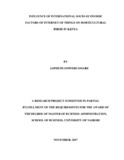| dc.description.abstract | The horticultural firms in Kenya are faced with the reality of competing in a global environment while having to act in a local environment to meet demand of high quality products of a dynamic market. This has pushed the actors in the sector to innovate by adoption of new technologies including Internet of Things (IoT). With the development of this new technology of IoT, questions on the socioeconomic impacts of IoT in relation to future performance of the horticultural firms and the advantage of new technologies to the key actors remain unanswered. Therefore, this study sought to establish the influence of international socio economic factors of internet of things on horticultural firms in Kenya. The study will be of significance to the horticultural firms in Kenya as they adapt IoT as a key production and supply chain component in accelerating their competitiveness in both the domestic and international market. The study applied a descriptive cross sectional survey, which enabled the researcher to obtain information from a wider category of horticultural firms for comparability. The design is also better suited where there are few respondents targeted. A non-probability sample of twelve large horticultural firms in Kenya was selected that was more suitable in meeting research objectives by providing detailed explanation on socio-economic impacts of IoT in horticultural firms in Kenya. Primary data was collected using structured questionnaire and quantitatively analysed using Statistical Package for Social Sciences (SPSS). The study found out that over 65% of the firm faced labour issues attributed to adoption of IoT that had unforeseen effects of social evils including drug and substance abuse, cyber-crime and internet pornography. Moreover, over 67% of the firms had experienced economic challenges and over 40% of the firms were already deploying IoT machines in the range of 1,000-10,000. The research recommended adoption of IoT technologies by the horticultural firms to increase food production and market access. The study depicted the need for government working hand in hand with horticultural firms in capacity building, development of audit standards and policymaking including tax planning. The study was limited by the research methodology where some respondents were uncomfortable commenting on their employer especially at a time when the country was facing a charged repeat presidential election | en_US |



